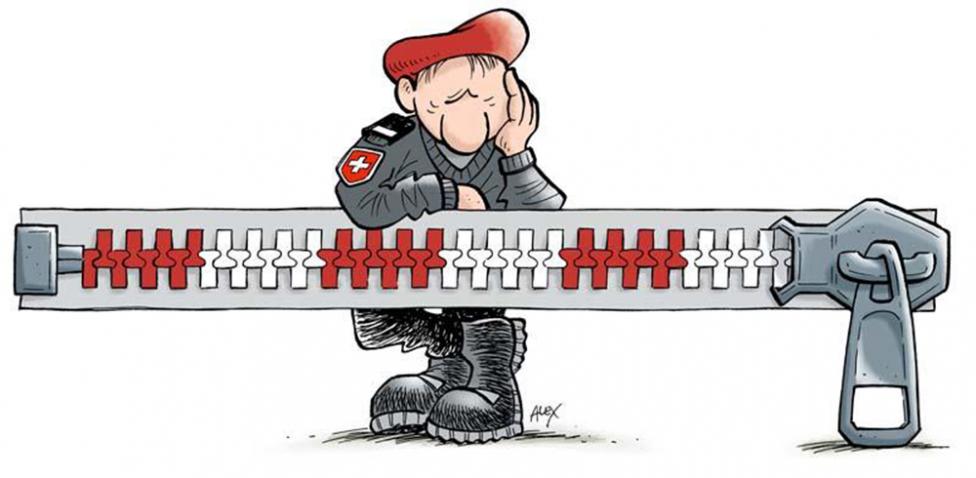Swiss immigration vote spreads ‘hope’ in Britain

Switzerland’s vote to bring back quotas for European Union workers has galvanised Britain’s Eurosceptics. Observers say it will have implications for the country’s policy and own debate on immigration.
The UK Independence Party (UKIP) and Eurosceptic Conservatives are pointing to the Swiss relationship with Europe to argue that Britain could also set its own quotas if it too were out of the EU.
“The Swiss people have taken advantage of their position outside the European Union to set their own immigration rules in their own national interest and I congratulate them for doing so,” said UKIP leader Nigel Farage in a statement.
“Were the British people to be given their own referendum on this issue then the result would be the same – but by a landslide.”
The Swiss vote over tightening immigration rules has echoes of the debate in Britain.

More
Swiss agree to curb immigration and rethink EU deal
Business leaders and bankers have warned about the dramatic consequences of any British retreat from the EU or curbing of immigration rights.
Research published by a think tank, the Institute of Economic and Social Research, says that if net annual immigration is slashed to 100,000 a year, the economy would be 11% smaller by 2060 and GDP per head would be 2.7% lower.
However, Sam Bowman, research director at the Adam Smith Institute, says that in Britain as in Switzerland, while many people know of the economic benefits that free movement can bring, government policies have failed to address people’s concerns or even misconceptions about the potential social impacts of higher immigration.
Last July, for example, in a survey published by Ipsos Mori, most of those polled thought 31% of Britain’s population were immigrants (that is, were born elsewhere) when the real figure is 13%.
When asked how many immigrants were asylum-seekers, most people polled estimated the figure at 21% when it is actually 4%.
Net migration to Britain in the year ending June 2013 was 182,000, says the Office for National Statistics (compared with 167,000 in the year ending June 2012).
The figure is made up of 503,000 people who came to live and work in Britain for more than 12 months in the year to June 2013, compared with 517,000 the previous year.
However, the emigration figures show 320,000 left Britain to live and work abroad compared with 349,000 the previous year.
Of the 106,000 net migration from the European Union, 36,000 was from the A8 (Czech Republic, Estonia, Hungary, Latvia, Lithuania, Poland, Slovakia, Slovenia)
The main increase in immigration has come from migrants from the troubled southern European eurozone economies of Spain, Italy, Portugal and Greece.
The number of European migrants living in Britain is almost exactly matched by the 2.2 million Britons living elsewhere in the EU.
Litmus test
UKIP has called for Britain to pull out of the EU and pull up the drawbridge on immigration.
The first important test of national sentiment will be European Parliament elections in May.
Turnout is likely to be low, so a party that can mobilise voters who feel strongly about Europe stands to gain.
According to market research agency YouGov’s first poll last month, the Conservatives would end up third to UKIP and Labour. In which case the Conservative government will be even keener to brandish its anti-immigration stance ahead of the next general election set for May 2015.
Hard or soft line?
The decision by Prime Minister David Cameron to offer voters an in/out referendum on the EU by 2017 if the Tories win the next election was prompted in part by fear of UKIP, say observers.
Adam Memon, head of economic research at the Centre for Policy Studies believes the EU’s response to the Swiss vote could have an impact on the proposed 2017 referendum.
“I think we will be looking quite closely at how the EU deals with Switzerland violating its treaty particularly as regards the future access of Switzerland to the single European market,” he said.
Memon adds that it is potentially a lose-lose situation for the EU.
“If the EU adopts a hardline towards Switzerland it is likely to fuel EU mistrust and resentment in the UK.”
“If it takes a soft line, it is likely to fuel hope here that the UK can withdraw from the EU and then try to negotiate favourable access to the single market without accepting the principle of free movement.”

More
Will the EU give Switzerland the cold shoulder?
Brussels ‘bullies’
The latest available data (see infobox) shows net migration in the year ending June 2013 was 182,000, down from a peak of 255,000 in the year ending September 2010.
This suggests that, while not yet reaching its target of a 100,000 cap, the government has succeeded in overseeing a reduction in net migration.
What the Swiss vote has shown, however, is that business and political leaders in Britain will have to do more than simply repeat the old mantras that the EU is the biggest single market for British exports of financial services and that the prosperity of the City depends on foreign capital and people.
“Mass economic immigration in Europe is a serious matter which has caused great unease because it drives down wages, puts pressure on social services and makes people feel strangers in their own land,” argued Farage after the vote.
Labour leader Ed Miliband already vowed last September to cut immigration if the party won the next election.
A spokesman for Cameron noted on Monday: “What this [Swiss vote] does reflect is that there is growing concern about the impact that free movement can have. That is why the prime minister and other ministers have been raising this issue and will continue to do so, with their counterparts across the EU.”

In compliance with the JTI standards
More: SWI swissinfo.ch certified by the Journalism Trust Initiative












You can find an overview of ongoing debates with our journalists here . Please join us!
If you want to start a conversation about a topic raised in this article or want to report factual errors, email us at english@swissinfo.ch.